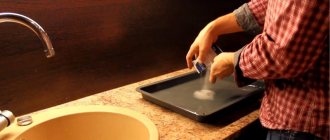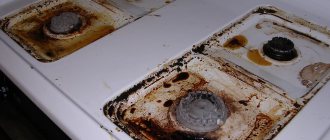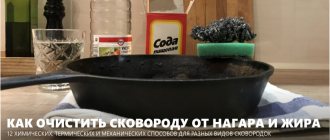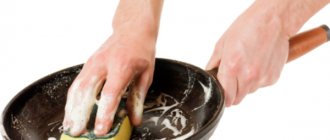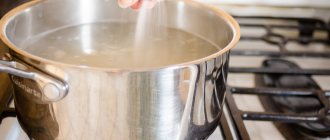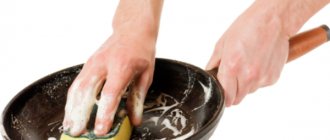To reduce cleaning of a gas stove in the kitchen, some people try to cook carefully and cover the cooking surface with foil or special fiberglass covers. Agree that these methods are ineffective, because the grate remains unprotected and grease and soot still accumulate on it.
You can get rid of dirt using commercial detergents, but not all of them are safe for health and the environment. We will tell you how to clean the grate of a gas stove without expensive chemicals. In this article we will look at the most effective home remedies that will help cope with various types of pollution. We will select the best ways to combat carbon deposits and grease on stainless, cast iron, and enameled grates.
Preparing for general grill cleaning
The grate should be cleaned separately from the gas stove. The structure must be carefully removed from the hob. If there are rubber or plastic stands, they must also be removed. Sectional lattice products can be conveniently washed in a dishwasher or in a prepared basin with a special detergent.
On some stove models, the grate cannot be removed; in this situation, it is more difficult to wash off the grease. Cleaning will have to be done on the stove. To remove dirt in hard-to-reach places, additional small brushes are used.
When washing a gas stove, only wear durable rubber gloves. They will protect the skin of your hands from the negative effects of detergents, protect your fingers from sharp protrusions on the grill and prevent you from getting dirty with soot.
To wash the stove grate, it is better to buy gloves with a corrugated surface. They do not slip, so wet parts will not fall out of your hands. The rough surface can be used to wipe off minor stains.
Before you clean the grate of your gas stove with purchased powders or improvised means at home, you need to look at what material the structure is made of (cast iron, enamel or steel). Because some potent products can “corrode” not only carbon deposits, but also the top layer of coating.
Use of household chemicals
Housewives are often interested in how to clean a gas grill at home. One of the popular methods is the use of household chemicals. The choice of such products depends on the material from which the product is made; for example, special products are produced for stainless steel that preserve the shine of the item.
Ready-made products vary in price and method of application (sprays, gels). Among the most popular means are the following:
- "Silit." A product from the middle price category. Easy to apply. Exposure time 15 minutes;
- "Sif." Cleansing cream. I often ask housewives how to clean cast iron grates on the stove. Cream "Sif" is a universal product suitable for various surfaces, including cast iron. It is applied with a sponge and left for 15 minutes. and then easily remove dirt;
- "Amway" is a safe and fast-acting gel. After exposure to the gel, the dissolved fat is very easily removed with an ordinary sponge. The product has only one drawback - a rather high price;
- "Sanita." Produced by a Russian company. Available in spray and gel form. The product not only effectively removes carbon deposits in just a few minutes, but also kills microbes on the surface treated with it.
- "Shumanite." It is produced by an Israeli company and has a fairly high price. The product is very effective, but can negatively affect the respiratory system and skin. To avoid this, it is recommended to work with Schumanite with the windows open, wearing a respirator and gloves.
Ready-made kitchen cleaning products always contain aggressive components (alkalis, acids) that quickly dissolve carbon deposits, and therefore, to protect the respiratory organs and skin from potentially harmful components, it is necessary to work in a respirator, gloves and with ventilation turned on.
Methods for cleaning cast iron grates
Many people buy gas stoves with cast iron grates. They are strong, incapable of deformation from high temperatures and durable.
Despite its massive appearance, cast iron is still a finicky metal and should be cleaned carefully.
Cast iron grates cannot be washed in a dishwasher. Prolonged contact with water can cause metal to become damaged and rusty.
You should not scrape off grease from a cast iron grate with a knife, as metal particles may be scraped off along with the dirt. It is not recommended to use metal brushes.
The material also reacts poorly to strong abrasive substances. Next, we'll look at the best and safest cleaning methods.
Method #1 - calcination by fire
This is the best method for cleaning cast iron grates; it will get rid of a layer of fat even in hard-to-reach places. You can heat the grate directly over the gas burners or use a gas burner for this purpose.
It is best to bake a cast iron grate outdoors. You can light a fire or use a gas burner for this purpose. During the burning process, fat emits an unpleasant odor. If the procedure will be performed indoors, be sure to open the windows and turn on the hood. By the way, the kitchen hood also needs to be cleaned of grease from time to time.
Algorithm of actions:
- Place the grate over a lit burner or open flame.
- Periodically turn the cast iron structure over so it can warm up on all sides.
- Wait until the fat burns out completely.
- Allow the rods to cool.
- Wipe the grate with a damp cloth to remove soot and remaining dirt. Dry the product immediately.
Calcination can also be performed in sand. To do this, the grid is placed on a metal sheet or baking sheet. Cover it with sand and place the container on the fire. Contaminants from the structure should burn out within a couple of hours.
Method #2 - cleaning with laundry soap
For this procedure you will need a bar of 72% laundry soap and 100-150 grams of office glue. Pour water into a container of suitable size and heat it almost to a boil. Then add grated soap and glue, mix everything thoroughly. A grate is lowered into the finished substance and “cooked” for about two hours.
The high temperature will melt the fat; after the procedure it must be washed off the hot metal structure. If the dirt has partially come off, then the residue can be wiped off with the hard side of a dishwashing sponge. Be sure to dry the grate immediately; you cannot leave it wet.
Method #3 - washing the grill with 9% vinegar
Add 3 tablespoons of 9% vinegar to a container of water. The stove grate is soaked in the solution and placed in an oven preheated to 60-80 degrees.
Some people use regular dishwashing detergent instead of vinegar. The effect is no worse - the fat layer is steamed and comes off easily
The steaming procedure will take at least 30-40 minutes. Afterwards, grease stains can be wiped off with a sponge. Once again, it is better not to wet the cast iron rods. This method is optimal for oversized gas stoves where the grate is not too large or sectional.
What not to do when cleaning the oven
After cleaning the oven, do not immediately cook food. If the smell is not too strong, just preheat the oven for 5-15 minutes. This will burn out the remaining substances and the smell will disappear.
If the smell is very strong, chemical neutralization is required. Pour one liter of water into a baking tray and place 10-15 tablets of activated carbon. Place in the oven, turn on and leave for half an hour or so. At the same time, make sure that the water does not boil away, adding it if necessary. After turning off, pour out the liquid and wash the baking sheet. The smell should disappear (or almost).
- Choose your cleaning products carefully. As already mentioned, active chemicals should not be used for aluminum and rubber.
- Do not use abrasive substances to clean the walls and glass; you will certainly damage the surface. Even when working with baking soda, be careful not to scrub too hard.
- Also, do not overdo it with metal sponges and brushes.
- Do not use chlorine-containing products.
Cleaning enamel grilles
Such grates look more attractive than their cast iron counterparts. They are light, not afraid of water and have a smooth shiny surface.
The enamel coating does not have increased resistance to mechanical damage. To protect the structure from scratches, it is better not to use aggressive detergents for cleaning. The product can be washed in the dishwasher if its dimensions allow.
To remove carbon deposits from the enamel grill in the dishwasher, you need to use the longest wash cycle with the highest possible temperature. Add more detergent than usual
Not everyone has a dishwasher, so we will figure out how to clean the enameled grate of a gas stove from fat and carbon deposits using improvised means.
No. 1 - a mixture of dry mustard and vinegar
Mustard has disinfectant properties and is able to break down fat. It is completely safe for health, so it can be used as a household cleaner.
Steps for cleaning the grille:
- Mix the ingredients: 3 spoons of 9% vinegar, 3 spoons of mustard powder, 1 spoon of dishwashing detergent.
- Using hot water, bring the substance to a pasty state.
- Apply the resulting product to the bars of the grill.
- Leave for 2-3 hours, depending on the degree of contamination of the product.
- Rub the structure with a washcloth and wash off the dirt.
Cleaning the grates in this way does not require large investments and is quite easy to do.
No. 2 - vinegar and water
Vinegar is good at cutting through grease and is often the main ingredient in many cleaning products. To clean the grate of a gas stove from carbon deposits, soak it in vinegar and water (1:1) and leave it overnight. Before the morning, the dirt will dissolve; you just need to rinse and dry the enamel structure.
No. 3 - melamine sponge
Mustard and vinegar work well with carbon deposits, but in both cases it takes at least 3 hours to complete the procedure.
And if guests are “on the doorstep” and you need to get rid of fat urgently, how can you quickly clean the grate of a gas stove? In such a situation, a melamine sponge will help.
Melamine sponge has recently appeared on the market. The product is expensive. But it is still a popular remedy because it allows you to effectively and quickly get rid of various surface contaminants.
Using a sponge is very simple: wet it with water, wipe the grill bars and rinse with clean water. Using the product, you can get rid of carbon deposits not only from enameled surfaces, but also from cast iron and even steel structures.
Housewives reviews
If there are no rubber or plastic pads, you can burn them in a fire at the dacha or in the courtyard of a private house. My husband fires all my old frying pans, cauldrons and stove grates every year in the summer, they become like new. Carbon deposits that cannot be washed off simply burn out
Marcia
https://www.stranamam.ru/post/3222354/
I clean the grill... I clean it with regular oven cleaner for 25 rubles, like Emway's, I had it, it's an excellent product, but the product costs 25 rubles. is no different in terms of cleansing, in general, I apply it thickly, put the lattice in a basin and go away for 2-4 hours to run errands, then I fill it with hot water and wait until it cools down, it washes off with a bang, I don’t even need to use an iron brush You just need to walk a little somewhere without pressing.
Ninelka21
https://www.stranamam.ru/post/3222354/
I somehow got confused, poured a bath of hot water, poured out half a glass of something like stinking white, lowered the grate into it and went to bed. In the morning, or rather in the afternoon, I came, and 90% of the grill came off in pieces.
Tatius
https://www.stranamam.ru/post/3222354/
She dragged the grate into the village. I soaked it for 2 days and wiped it off with ash. Now it’s like new... now you can clean it with gels and any other means, for such a beauty - it’s not a pity, but I wanted to throw it out in my heart.
ir4en
https://www.stranamam.ru/post/3222354/
I had this problem. I'm tired of it - now I clean it often so that it doesn't get covered in fat. Here’s how I washed it: I brought the grate into the bathtub, soaped it with soapy water (so that there was a lot of foam) and left it for a day. After that, I rubbed it with baking soda and that’s it, all that was left was to wash it off with a sponge.
Lyuba
https://o4istote.ru/poryadok-v-dome/reshetka-plity/
I wash the grate from the gas stove (and not only it) with Amway oven cleaner-gel. Apply, wait 10-15 minutes, rinse with water. Corrodes any fat, soot.
MaPa
https://malyshokpskov.mybb.ru/viewtopic.php?id=7781
Oh, the grille is (was) a sore subject for me. I also cleaned the stove grate a week ago (I don’t remember the last time it was thoroughly cleaned). There was a lot of soot. I read about Schumanit on the Internet, but I couldn’t get to the store... But I had the urge to wash it right now. I found Amway for the oven in the cabinet. I poured a bath, soaked the grate, then smeared it with Amway (more than once). I thought that now my grille would sparkle! But it was not there! I ended up scraping with a knife and tore everything off on the fourth go. I took a bath, of course.
Ivolga
https://malyshokpskov.mybb.ru/viewtopic.php?id=7781
There is a very cruel way: burn. That is, you place part of the grate on a hot burner, and so gradually everything burns. Cruelty in the smell and smoke (((But effective.
Rumia
https://malyshokpskov.mybb.ru/viewtopic.php?id=7781
I have a drill attachment in the form of a round iron brush, and I clean it with it. It's a little noisy and dirty, but it cleans well.
Ordinary
https://otvet.mail.ru/question/29198348
Toothpaste, apply generously and brush for a long time!
Alexander Gusev
https://otvet.mail.ru/question/29198348
I rearrange them (the grates) from time to time so that the fattest part is above the largest burner - the fat burns out. If it’s critical to wash it right away, I plug the sink with a stopper, fill it with very, very hot water (sometimes I add boiling water from the kettle) and let it cool. You can throw in a handful more soda. The fat swells and is removed in a few movements with a washcloth. At the same time, the sink is also cleared of dark stains.
Karaidel
https://flylady-ru.livejournal.com/1375843.html
I can only give anti-advice. Do not soak these grates in an old cast iron bathtub. My landlady did this. I have not been able to remove the rust stains for 2 years.
dormouse_jenny
https://flylady-ru.livejournal.com/1375843.html?page=2#comments
I spray Frosch and baking soda on it, then go over it with steel wool. The fat was gone. (The grate is cast iron, divided into 2 parts, sticks out of the sink and does not fit into the basin).
Milkyns
https://flylady-ru.livejournal.com/1375843.html?page=2#comments
Cleaning grease from steel grates
Steel products are the most unpretentious of all grating options. Therefore, you can clean them using any of the methods described above. We have also selected a few more products that can be used to effectively remove grease from a steel grate on a gas stove.
If the layer of fat is impressive, then ammonia is used. One jar of the product is poured into a bag with a lattice and screwed tightly.
To clean the grill with ammonia, it is convenient to use bags with a Zeep fastener. You can evenly distribute ammonia over a metal product using a spray bottle.
It is better to take the package out onto the balcony or street. It is ideal to wait 5-6 hours and then rinse the grill with water. Grease and carbon deposits can be easily removed. Be sure to carry out the procedure with gloves, because you can damage the skin of your hands.
In addition, steel gratings can be easily cleaned with abrasives, rubbed with metal brushes and scraped with a knife. Some people rub the structure with sand until all the fat comes off, and then simply rinse with water.
Soap solution
- soak cast iron grates in water, soap solution or other liquid products: cast iron loses its strength under the influence of water and may become cracked;
- rub any grate too hard with metal brushes, as this leads to the appearance of pores on the surface of the metal and damage to it;
- soak hot grates immediately after cooking: the temperature difference makes the metal brittle;
- sand clean modern cast iron grates: Chinese-made grates, which are the majority on the market today, are made of white cast iron, which is the least durable of all types of cast iron. And the sand is simply teeming with microorganisms and bacteria, as well as the remains of animal and insect excrement. It is better to choose a safer abrasive (soda or mustard) or professional products.
Modern method of mechanical cleaning. This newest invention appeared on store shelves quite recently, but has already managed to prove itself only from the best side. The melamine sponge already contains a cleaning agent and consists entirely of melamine. To achieve good results, moisten the sponge with water and wash the product, cleaning each twig individually. After this, it is washed under water.
Folk remedies Recipes for masks At home Hair loss in women How to stimulate growth Causes of hair loss Hair loss in men Review of vitamins Helpful tips
Recommendations for caring for the stove grate
In addition to maintenance, a gas stove requires care. In order not to wash the grate for hours, you need to constantly maintain the cleanliness of the stove and its components.
Grease splatters are easier to clean up if they are fresh, so always wipe down the stove after cooking.
If you arrange a “sanitary day” for your gas stove at least once a week, you will spend significantly less time fighting grease and carbon deposits in the future.
Care instructions:
- Fresh grease stains can be easily removed with lemon. The dirty surface of the grill is simply rubbed with a slice of lemon and after 30 minutes wiped with a regular sponge.
- Do not leave the grate wet - grease and dust stick to wet surfaces faster.
- If the grate smells bad, spray it with vinegar and sprinkle salt on it. After 15 minutes, rinse everything off and wipe dry.
- After removing stains, streaks may remain on the metal structure. You can get rid of them using a steam cleaner; it will destroy residual grease in hard-to-reach places and eliminate smudges.
To avoid contamination of the gas stove as a whole, some housewives recommend covering the surface with foil before starting cooking. After finishing cooking, the foil is removed. Then there are no traces of grease splashes left on the hob.
Also, during preventative cleaning, do not forget to clean the stove handles. What can you use a paste made from soda and water for? It is convenient to apply it with a toothbrush, treating not only the handles, but the contaminated areas nearby. The composition is suitable for cleaning removable and non-removable handles.
Causes of pollution
Knowing the cause of pollution, it is easier to prevent its formation. It is not always possible to create a culinary dish accurately. During the cooking process, food particles, fat, or leftovers from cooked foods may fall onto the stove or grate. Such contamination can occur several times a day. Layer after layer is absorbed into the rods, causing carbon deposits to form, which, under the influence of fire, become covered with solid scale.
It is easier to remove a fresh stain than a stubborn stain. It is recommended to treat the stove with a damp sponge after each cooking process.
Conclusions and useful video on the topic
The video below will allow you to compare and evaluate the effectiveness of the most popular home methods for cleaning gas stove grates:
There are many options for easily cleaning gas stove grates from grease. Mustard powder, soda and other homemade “cleaning” products cost pennies. However, they cope with carbon deposits and various contaminants no worse than expensive store-bought gels. The main thing is to choose the right cleaning method for cast iron and enameled structures and don’t forget to wear gloves. Steel gratings are easy to maintain and can be washed using any of the methods listed in the article.
What tools do you use to clean the grate? Or do you think that it’s easier to buy a bottle of cleaning “chemistry” than to experiment and tinker with calcination and preparing various home remedies? Express your opinion, take part in the discussion, ask questions that interest you on the topic of the article - the comment form is located below.

